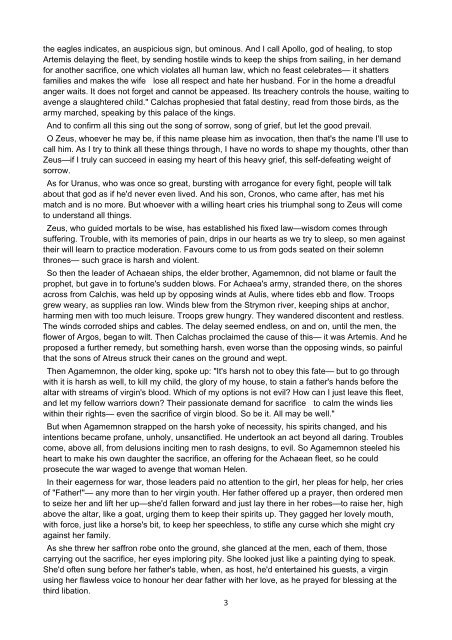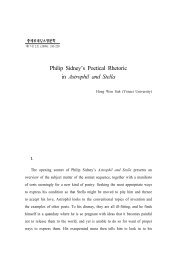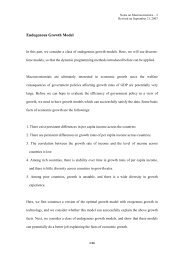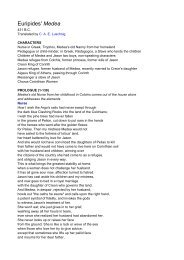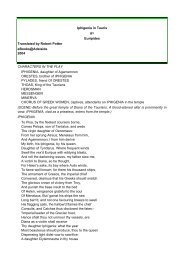Aeschylus Agamemnon
Aeschylus Agamemnon
Aeschylus Agamemnon
Create successful ePaper yourself
Turn your PDF publications into a flip-book with our unique Google optimized e-Paper software.
the eagles indicates, an auspicious sign, but ominous. And I call Apollo, god of healing, to stop<br />
Artemis delaying the fleet, by sending hostile winds to keep the ships from sailing, in her demand<br />
for another sacrifice, one which violates all human law, which no feast celebrates— it shatters<br />
families and makes the wife lose all respect and hate her husband. For in the home a dreadful<br />
anger waits. It does not forget and cannot be appeased. Its treachery controls the house, waiting to<br />
avenge a slaughtered child." Calchas prophesied that fatal destiny, read from those birds, as the<br />
army marched, speaking by this palace of the kings.<br />
And to confirm all this sing out the song of sorrow, song of grief, but let the good prevail.<br />
O Zeus, whoever he may be, if this name please him as invocation, then that's the name I'll use to<br />
call him. As I try to think all these things through, I have no words to shape my thoughts, other than<br />
Zeus—if I truly can succeed in easing my heart of this heavy grief, this self-defeating weight of<br />
sorrow.<br />
As for Uranus, who was once so great, bursting with arrogance for every fight, people will talk<br />
about that god as if he'd never even lived. And his son, Cronos, who came after, has met his<br />
match and is no more. But whoever with a willing heart cries his triumphal song to Zeus will come<br />
to understand all things.<br />
Zeus, who guided mortals to be wise, has established his fixed law—wisdom comes through<br />
suffering. Trouble, with its memories of pain, drips in our hearts as we try to sleep, so men against<br />
their will learn to practice moderation. Favours come to us from gods seated on their solemn<br />
thrones— such grace is harsh and violent.<br />
So then the leader of Achaean ships, the elder brother, <strong>Agamemnon</strong>, did not blame or fault the<br />
prophet, but gave in to fortune's sudden blows. For Achaea's army, stranded there, on the shores<br />
across from Calchis, was held up by opposing winds at Aulis, where tides ebb and flow. Troops<br />
grew weary, as supplies ran low. Winds blew from the Strymon river, keeping ships at anchor,<br />
harming men with too much leisure. Troops grew hungry. They wandered discontent and restless.<br />
The winds corroded ships and cables. The delay seemed endless, on and on, until the men, the<br />
flower of Argos, began to wilt. Then Calchas proclaimed the cause of this— it was Artemis. And he<br />
proposed a further remedy, but something harsh, even worse than the opposing winds, so painful<br />
that the sons of Atreus struck their canes on the ground and wept.<br />
Then <strong>Agamemnon</strong>, the older king, spoke up: "It's harsh not to obey this fate— but to go through<br />
with it is harsh as well, to kill my child, the glory of my house, to stain a father's hands before the<br />
altar with streams of virgin's blood. Which of my options is not evil How can I just leave this fleet,<br />
and let my fellow warriors down Their passionate demand for sacrifice to calm the winds lies<br />
within their rights— even the sacrifice of virgin blood. So be it. All may be well."<br />
But when <strong>Agamemnon</strong> strapped on the harsh yoke of necessity, his spirits changed, and his<br />
intentions became profane, unholy, unsanctified. He undertook an act beyond all daring. Troubles<br />
come, above all, from delusions inciting men to rash designs, to evil. So <strong>Agamemnon</strong> steeled his<br />
heart to make his own daughter the sacrifice, an offering for the Achaean fleet, so he could<br />
prosecute the war waged to avenge that woman Helen.<br />
In their eagerness for war, those leaders paid no attention to the girl, her pleas for help, her cries<br />
of "Father!"— any more than to her virgin youth. Her father offered up a prayer, then ordered men<br />
to seize her and lift her up—she'd fallen forward and just lay there in her robes—to raise her, high<br />
above the altar, like a goat, urging them to keep their spirits up. They gagged her lovely mouth,<br />
with force, just like a horse's bit, to keep her speechless, to stifle any curse which she might cry<br />
against her family.<br />
As she threw her saffron robe onto the ground, she glanced at the men, each of them, those<br />
carrying out the sacrifice, her eyes imploring pity. She looked just like a painting dying to speak.<br />
She'd often sung before her father's table, when, as host, he'd entertained his guests, a virgin<br />
using her flawless voice to honour her dear father with her love, as he prayed for blessing at the<br />
third libation.


